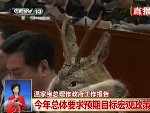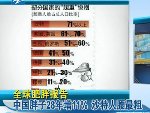我在中国日报谈反腐促进经济增长
中文摘要:反腐败是否影响经济增长争论激烈。本文认为,反腐对经济增长的影响有短期和长期作用。短期内,在腐败水平低时,有利经济增长;在腐败水平比较高时,可能会拖慢经济增长。长期来看,反腐斗争可以降低腐败水平,因而,有利长期经济增长。同时,反腐斗争,不仅对经济的长期发展有利,而且,对社会公平、平等、和谐也有利。所以,我们从理性角度考虑问题,强力支持当前的反腐斗争。
Anti-corruption campaign will boost economy
http://www.chinadaily.com.cn/opinion/2015-03/09/content_19753224.htm
By Yao Shujie and Wang Feng (China Daily)Updated: 2015-03-09 07:54
The anti-corruption drive launched by the top leader Xi Jinping and top graft-buster Wang Qishan since the 18th CPC National Congress has produced powerful shockwaves that have spread throughout the Chinese political system and society. It has also been associated with the serious economic slowdown, as the country's GDP is decelerating quickly from its breakneck growth of recent years.
This has led some people to believe that the anti-corruption campaign must have put the brakes on economic growth. Simon Denyer, The Washington Post's bureau chief in China, is one of them. In a recent article querying whether the Chinese economic system can function without corruption, he wrote "as China moves into the third year of its far-reaching anti-corruption campaign, experts and officials are worrying that without the grease of bribes, projects are stagnating and the economy is taking a hit".
Denyer suggests that the anti-corruption campaign has led some officials to take a wait-and-see attitude, reluctant to take any action that may promote economic growth because they are afraid of making any mistake and being prosecuted as a result of any possible "wrongdoing".
He quoted one Chinese scholar as saying "the problem has become so serious that Premier Li Keqiang has asked local government officials to sign a written pledge to carry out major economic and social policies faithfully as dereliction of duty has set back central government economic growth measures".
Denyer observes that the anti-corruption campaign has hit sales of luxury goods and the business activities of high-end restaurants and hotels.
In sharp contrast to Denyer's article, an opinion piece was published on the home page of the CPC's Central Commission for Discipline and Inspection website, arguing that such claims are misleading and counterfactual, as the recent economic slowdown has not been caused by the anti-corruption campaign, but by the government's efforts to restructure the distorted economy after a long period of rapid expansion and other factors such as the tough external environment, the rising costs of production, the need to control pollution and domestic currency appreciation.
China's GDP growth of 7.4 percent, with an absolute increase of $1.1 trillion in 2014, was not a bad performance. There is no doubt that China is still a potent engine of growth for the global economy.
China's GDP only overtook that of the United Kingdom in 2005, that of Germany in 2007 and Japan's in 2010, but today, it is almost four times more than the UK's, three times that of Germany's and more than two times that of Japan's.
One needs to remember that corrupt consumption of luxury goods and dining in expensive restaurants by government officials and businessmen is an "abnormal" phenomenon. It seemingly drives economic growth, but it accentuates inequality and causes social and political discontent.
With the anti-corruption campaign, China can improve political stability and the government can gain trust from the people. These are necessary conditions for social justice and long term economic growth.
In fact whether the anti-corruption efforts are helpful or harmful to economic growth in the short-term depend on the level of corruption. When the level of corruption is low, anti-corruption efforts will lead the economy to grow faster. However, when the level of corruption is high, the short-term effects of the anti-corruption efforts on economic growth will be negative, meaning that corruption's "lubricating" effect dwarfs its "drag" on the economy.
One could then argue that the current level of corruption in China is high, and hence, the anti-corruption campaign being maintained by Xi and Wang might in part have caused the Chinese economy to slow down. But this is only a small part of the full story. The truth is that the long-term effects of anti-corruption efforts on economic growth are far more profound than their short term impact.
In the long term, anti-corruption efforts will reduce the level of corruption, and hence, they will definitely promote long-term economic growth.
Further analysis suggests that if the current anti-corruption campaign is able to reduce the level of corruption by a half, it will generate a long and sustained positive effect on economic growth.
Furthermore, it should be stressed that not only is the anti-corruption campaign beneficial for China's long term economic growth, it will also help create a more equitable, just and harmonious society, which is the necessary foundation for the ruling Communist Party of China to lead the country to its next level of social and economic development.
Yao Shujie is professor of economics at the University of Nottingham and Chongqing University. Wang Feng is an associate professor at Chongqing University.
发送好友:http://finance.sixwl.com/jingjixuejia/182866.html
更多信息请浏览:第六代财富网 www.sixwl.com
上一篇:住房需求能够释放的三个基本前提
下一篇:微信行为学 之一
·易纲解读宏观数据CPI涨幅在可见的未来还是正数2015.03.10
·CPI小涨PPI再走低 政策走向引期待2015.03.10
·银行地产护盘 期指V型反转2015.03.10
·股指期货主力合约高开0.33% 多空分歧扩大2015.03.10
·早盘超大账户抢筹的50只个股3102015.03.10
·早盘主力重点关注的50只个股3102015.03.10
 图看“两会”中官员的帽子
图看“两会”中官员的帽子 59岁赵雅芝罕见青涩童年少女旧照
59岁赵雅芝罕见青涩童年少女旧照 中国胖子28年增11% 沙特人腰最粗
中国胖子28年增11% 沙特人腰最粗 女人犯虎谁也没招
女人犯虎谁也没招 一只环游世界的鸭
一只环游世界的鸭 女子跳桥武警双手
女子跳桥武警双手 明星书画值不值得
明星书画值不值得 酒店邀中外模特办
酒店邀中外模特办